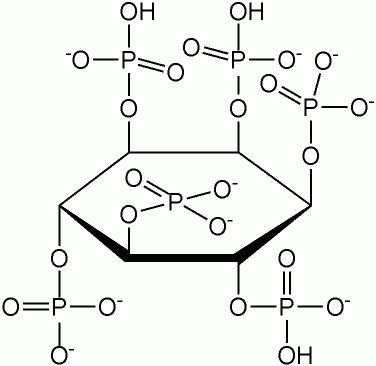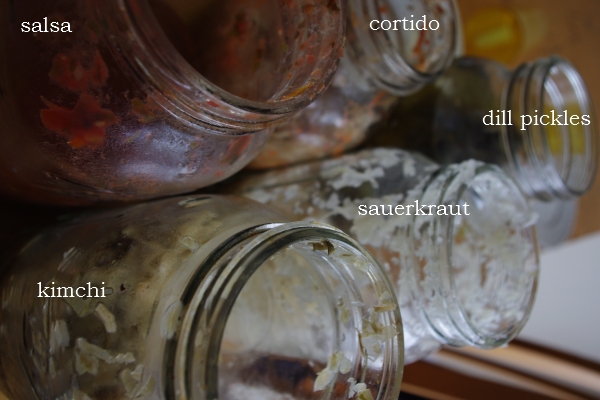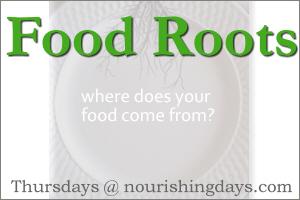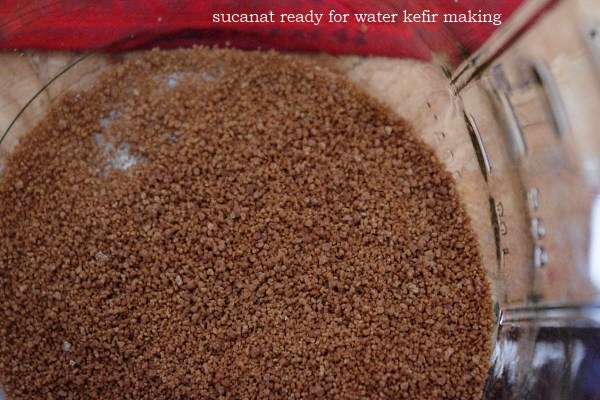Phytic Acid: Defining and Dealing With A Common Antinutrient

If you’ve been hanging around the traditional or real food worlds for any length of time you have heard about the detriments of phytic acid. It’s been called an anti-nutrient by many, while some claim health benefits due to its chelating nature. So is phytic acid friend or foe?
When my husband was experiencing symptoms of mineral deficiency I decided to stop taking everyone’s word for it and start doing a bit of research of my own. This is the result of that research.
Phytic Acid Defined
Phytic Acid, also knows as inositol hexaphosphate (IP6), or phytate, is present in the brans and hulls of most grains, beans, nuts, and seeds. The ring you see above is the inositol (a B vitamin) constituent, which then has six phosphate groups attached. See all of those (-) symbols up there? That means that it is highly charged, which gives phytic acid its chelative (or binding) properties. Basically that means that phytic acid binds to minerals, metals and anything else it can get it’s hands on to and takes them out of the body with it.
Phytic Acid: Friend or Foe?
The American Journal of Clinical Nutrition found that the higher the dosage of phytic acid in ones bread, the lower the absorption of minerals. The Journal of Nutrition compared the absorption of minerals in inositols containing fewer phosphates. They found that the fewer phosphate groups did not inhibit absorption to the degree that phytic acid does.
So you could see how that would be bad. If, when phytic acid exits our bodies, it takes other nutrients with it; we are not really taking in the minerals from these foods. Worse yet, if we are already deficient then perhaps it will take what little we have left, exacerbating our health problems.
On the other hand, phytic acid is said to be a powerful antioxidant as well as helpful in ridding the body of heavy metals and other toxins. One such article comes from Science Direct: Protective Effect of Phytic Acid on Oxidative DNA Damage with Reference to Cancer Chemoprevention. In every article I came across that found phytic acid to be friendly it seemed to be used under special medical circumstances, not in the foods we eat every day.
My Conclusions
While I do not doubt that phytic acid could be used beneficially in some specific circumstances, it is clear that daily consumption leads to mineral loss. Furthermore I am disheartened by the lack of knowledge of phytic acid in the general community. I came across many articles in big name journals which I suspect those who write up dietary recommendations for the government would have access to. Clearly their interests do not lie in the health of the general public.
A while ago I wrote about my reasoning for and experience with soaking grains, nuts, and beans. My further research into phytic acid has only confirmed previous reasoning so I will continue to soak and ferment those foods high in phytic acid.
Further Reading and Resources
Here are some of the articles I read through in my research:
- Cambridge Journals: Phytic Acid
- Food-Info: What is Phytic Acid?
- The American Journal of Nutrition: Phytic acid added to white-wheat bread inhibits fractional apparent magnesium absorption in humans
- Journal of Nutrition: Inhibitory Effects of Phytic Acid and Other Inositol Phosphates on Zinc and Calcium Absorption in Suckling Rats
One of the best resources for the home cook that I have found dealing with phytic acid is Reducing Phytic Acid in Your Food: A visual analysis of the research on home kitchen remedies for phytic acid. Reading this paper answered a lot of my questions and gave me easy to apply methods for reducing phytic acid at home.
You can also purchase sprouted flour for baking and cooking, which will be low in phytic acid.
What do you think… is phytic acid worth paying attention to?




Wow–you’ve really done your homework! Thanks for the great information!
Thank you for an informative article.
WOW! Thanks for all your research. I really appreciate that;)
Thanks for the easy to understand overview. It’s great & I’ll be referring people to this in the future.
That was so helpful. Thanks for doing the research, and especially for explaining this clearly and concisely. I’ve been a little confused about the topic, so I really appreciated this post!
Wondered if you had ever seen this method of soaking? He claims 96% of phytic acid is neutralized this way.http://wholehealthsource.blogspot.com/2009/04/new-way-to-soak-brown-rice.html
Katie – That is interesting. I really need to do some home-testing to get some fun charts and graphs going.
Thank you for this post. I have been told I am iron deficient, and I eat plenty of red meat and spinach. I have recently begun soaking grains for my bread (which I do not eat much of) but I am going to start soaking grains and nuts and seeds for my daily granola as well as other bread-like recipes I make. I am writing a post about my resolve to properly soak my grains and I hope it’s okay if I link to this post! 🙂
Shannon,
I have been delving into this issue, too – http://www.kitchenstewardship.com/seriescarnivals/soaking-grains-an-exploration/.
Just one note: phytic acid and phytates aren’t the same thing. Breaking down the phytates would actually release phytic acid into the soak water, so there’s a lot more research to be done! On the other hand, anecdotal evidence is pretty strong that soaking does something…so I’m going to keep doing it for now!
🙂 Katie
hi Katie,
Just wanted to comment on the comment you left at ND. You mentioned the difference between phytic acid and phytate. Phytate is the “salt” form of phytic acid. For instance there is sodium phytate which is phytic acid with Na attached to the charged phosphate groups.
Chemically speaking, the terms phytic acid and phytate might be used interchangably to denote very similar molecules, even if they behave differently. At least that is what I was taught in my organic chemistry classes :).
Excellent points!
Linking to this helpful explanation!
All women making comments and seemed in the food mode…US Too.org mag for march or may says Colo Univ cancer center has study of p acid good for removing cancer. Seemed to be insinuating it would be helpful for prostate and breast cancer. You might check this out. I attend Wichita US Too chapter due to some concerns and I like to read the information their nat newsletter puts out. Interestingly, a recent newlettter article states all men will have p cancer and will die of it or with it??
Woody – Yes, I have read similar reports. I have a mixed feelings on this because on the one hand there are reports like the one you cited. On the other hand there are many traditional and very healthy cultures that soaked or fermented grains. I tend to go with the traditional cultures.
Wonderful post (I’ll be linking to it in my next post). The link to the rebuild market e-book says forbidden. I was able to go back to their homepage and find it but thought you may want to know.
Regarding the pasteurization process on raw almonds…
We have a small business that makes “crispy nuts” (higherpower.biz). As a result, we also have a close relationship with an almond grower in CA who has told us about the pasteurization process they use on his farm. Apparently the almonds are steamed for only 20 seconds in a high-temp, hot-steam spray.
As we know, it takes 12-24 hours of soaking to neutralize the enzyme inhibitors. Once those enzyme inhibitors are neutralized, and the life force is liberated, the nut/seed becomes highly digestible and we can assimilate the nutrients more effectively.
It doesn’t seem likely that the 20-second pasteurization process would break down the enzyme inhibitors (as noted by the author in the original text, above).
Nor does it seem likely that the pasteurization process kills the enzymes in that nut. The CORE TEMPERATURE of the nut must exceed 115 degrees in order for the enzymes to be destroyed. The steam pasteurization process happens at (around) 200 degrees, but it lasts for only 20 seconds. Is it possible the core temperature of that nut is affected by a twenty-second bath? We don’t know for certain, but we think not.
Basically, it seems…that the steam pasteurization process doesn’t hurt the enzymes, but it also doesn’t neutralize the inhibitors.
It seems to me that instead of going nuts ( sorry, crazy) trying to make detrimental foods safe by treating it through various methods that may or may not remove or deactivate the harmful components to a less harmful level, wouldn’t it be better to avoid the foods altogether?
I came across this as a health concern of mine by accident. In hind sight I now know that I sickened myself and damaged my health by switching to a “healthy” diet. I cut way back on meat,especially beef ( because it’s sooo bad for you) ate more fish and chicken, starteed making my own whole grain, Bob’s red mill organic bread, I added flax seeds to the bread, I added chia to my diet, I regularly ate oat meal, I started eating more raw vegeatables, and juicing too. Sounds really healthy doesn’t it. Well I got sicker, and more tired, and depressed, and sicker. ( but its the change in your diet!, the toxins being rekleased are making you sick! keep at it you’ll get better whaen you are clean! Bull shit!!!! The human is an animal that eats meat, not grasses, and definately not the seeds of grasses. I always wondered why I felt better if I ate a low protien white flour product rathjer than a high protien whole grain flour product. It’s the lectins, it’s the phytic acids, it’s all the stuff that the plant produces to keep animals and insect from eating it in the first place. Bugs and cows apparently are smarter than humans because where they learn not to eat things that cause them ill health, we keep trying to find a way to make it work to the detriment of our health. Cows woouldn’t eat the stuff if they had a choice between grasses and grains, but in our food supply they often have no choice. ( not to menton they have three more stomachs than the local vegan at the wheat grass juice bar) I now eat red meat 2-3 times a day, eat no whole grains, no nuts, no oats, no peanuts, … all the high phytic acid foods are 90% out of my diet, and when I do eat a grain based item, it is definately NOT whole grain or high protien. I haven’t felt this good in three years since I started my healthy eating habits in Dec 2007 I took me many months to figure out why the hell I was getting worse while eating healthier, and even when the reason was staring me in the face I just didn’t believe that what was held up as the best of the best foods, whole grain, organic, raw, meatless,… was killing me.
Paul – I actually am complete agreement with you, though I tend to come at it from a we should be growing and raising our own food perspective. I try not to eat any grains and am cutting way back on my nut and seed consumption. I’m like you and probably eat red meat at least once a day, eggs fried in butter at least once a day, and there is a lot of bacon & sausage as well. In planning our soon to be homestead I also believe that eating meat and vegetables is more likely than us growing a huge field of wheat or something. Homegrown bacon anyone?
Sounds like we may be on the right path. I forgot to mention the whole vegetable oil thing too. Butter and animal fats for me. Ghee, beef fat, but I do use organic palm oil sometimes. I am also looking to move back east and get some property for growing my own food and having my own source of water as the fluoride,chloramines, aluminum sulfates, and whatever prescription drugs are in trace amounts in the water are not as harmless as our gov’t is telling us it is.
I know I’m very late to this discussion but I just came this page in researching phytic acid. I want to know if you have read anything on the issue of phytates (the minerals salts). See; awhile back I read an article that talked about phytic acid being necessary for the absorption of minerals through its chelating properties. I believe this makes the case for why we ought to ferment and sour most, if not all, of our plants foods and all of our grains. The claim of the article’s writer was that phytic acid is necessary for the minerals to pass through the intestinal wall as cellular-sized mineral salts for cellular digestion. Basically that we are starving cellularly by the lack of the natural processing.
Jonathan – Even though I studied chemistry, most of my reasoning for fermenting/soaking is mostly experiential. It seems like everything is better for digestion and overall health when it is fermented. I think you bring up some good points, though. Thanks for sharing!
Food for thought to those concerned about the antinutrient ability of phytic acid. Keep in mind that IP6 isn’t an isolated compound in natural sources and will already be bound to a metal or mineral when you ingest it. For it to remove nutrients from the body it has to release a bind for a more favorable one that is loose in the body. IP6’s affinity is towards heavy metals over minerals which is why it’s natures master chelator.
Hello,
In emphasizing the depleting of nutrients through the use of phytic acid what seems to have been overlooked is the potential to REDUCE some destructive elements from our bodies, too. It can reduce cholesterol and triglycerides and also MAY reduce beta-amyloid. I think there’s some research into its theraputic effects on Parkinson’s disease although I haven’t seen more than one or two articles on this.
As with everything else, a person has to take all effects into consideration and make difficult decisions. Fortunately most decisions (to use it or not) can be reversed during experimentation. Frequent blood tests, CBC, Lipids, Vitamins, Liver enzymes ought to be scheduled when experimenting.
That last link “Reducing Phytic Acid in Your Food: A visual analysis of the research on home kitchen remedies for phytic acid” doesn’t work. I’d love to read that article. Can you redirect me please?
Thank you, Stacey D’Amico
Ahhhh…. Real science that makes sense. Thank you.
Phytic acid is showing promise as a powerful anti-cancer drug- http://drleonardcoldwell.com/2011/08/10/special-b-vitamin-proven-to-stop-cancer-growth-cold/. Plus it is naturally occurring in the body. And the health benefits of foods high in fiber, which contain the most phytic acid, should be considered as well.
So, which story is real? Or most compelling? I guess I don’t plan to eliminate it from my diet until more is known about its effect on cancer.
This is a great article.
I like to understand how food affects the body in order to optimize myself. It seems like most articles I find on the topic of nutrition are so simplified that they offer no reasoning, they simply state “X is good, Y is bad”. Actually explaining or at least mentioning the science behind the topic is very important to me because it allows me to learn more, to delve deeper and gain a better understanding.
Meh. Concern about phytates is vastly overblown. Its only an issue in diets extremely high in grains.
Phytate has many beneficial effects, such as removing excess iron, and preventing cancer. Phytate is a nutrient. It is metabolized in the body to “lower inositol phosphates” containing various numbers of phosphate groups. Like many nutrients, when consumed in large amounts it can result in an increased need for other nutrients (e.g. high vitamin D intake results in greater need for vitamin K2).
Soaking grains, nuts etc is not necessary unless one is consuming these foods almost exclusively. And thats a bad idea for plenty of other reasons.
And most people have too much iron anyway, which causes cancer, heart disease, metabolic disorders and oxidative damage generally.
Hello. I love how short, sweet, and to the point you’ve written this information. I am writing an article explaining phytic acid and why, if you’re not going to properly prepare your grains, you’re better off eating plain white rice. I’m seeking permission to link back to this article. You can email me at trixie(at)justtrixie(dot)com. Thanks for all your research and hard work. It is much appreciated.
“While I do not doubt that phytic acid could be used beneficially in some specific circumstances, it is clear that daily consumption leads to mineral loss..
it is clear ..based on what ground ?
Phytic acid impairs absorption of iron and zinc, and to a lesser extent calcium (2, 3).
This applies to a single meal, not overall nutrient absorption throughout the day.
In other words, phytic acid reduces mineral absorption during the meal, but doesn’t have any effect on subsequent meals.
For example, snacking on nuts between meals could reduce the amount of iron, zinc and calcium you absorb from the nuts, but not from the meal you eat a few hours later.
However, when you eat high-phytate foods with most of your meals, mineral deficiencies may develop over time.
In well balanced diets, this is rarely a concern, but may be a significant problem during periods of malnutrition, and in developing countries where the main food source is grains or legumes.
“Only in special medical circumstances, not in normal diet”? Don’t you know phytic acid has been found to have cancer-preventive properties? It’s not just due to ‘chelating nature’ either. http://onlinelibrary.wiley.com/doi/10.1046/j.1365-2621.2002.00620.x/abstract
Up the intake of minerals from your other foods, you get no problems and all the benefits.
…but of course, the very first, fawning uninformed comments from Loyal Regular Readers, will be visible at the top forever. Newer comments as outsiders inject some new information, will be unread St the bottom. Stupid system 😐